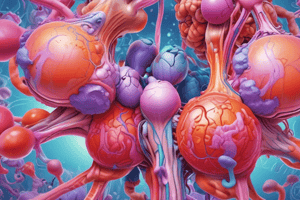Podcast
Questions and Answers
Which gland is known as the 'master gland'?
Which gland is known as the 'master gland'?
- Hypothalamus
- Pituitary Gland (correct)
- Adrenal Gland
- Thyroid Gland
What is the primary function of the thyroid gland?
What is the primary function of the thyroid gland?
- Regulate blood sugar levels
- Regulate body temperature, hunger, and thirst
- Regulate metabolism, growth, and development (correct)
- Produce stress response hormones
Which gland produces insulin and glucagon?
Which gland produces insulin and glucagon?
- Thyroid Gland
- Pancreas (correct)
- Pituitary Gland
- Adrenal Gland
What hormones do the ovaries produce?
What hormones do the ovaries produce?
Which function is NOT regulated by the hypothalamus?
Which function is NOT regulated by the hypothalamus?
What is the function of adrenal glands?
What is the function of adrenal glands?
Which type of feedback loop in the endocrine system stimulates hormone production?
Which type of feedback loop in the endocrine system stimulates hormone production?
What process is regulated by hormones during childhood and adolescence?
What process is regulated by hormones during childhood and adolescence?
Which of the following is NOT a function regulated by the endocrine system?
Which of the following is NOT a function regulated by the endocrine system?
What is the mechanism by which the endocrine system regulates hormone production by inhibiting production?
What is the mechanism by which the endocrine system regulates hormone production by inhibiting production?
Flashcards are hidden until you start studying
Study Notes
Overview of the Endocrine System
- The endocrine system is a network of glands that produce and regulate hormones in the body.
- Hormones are chemical messengers that help control various bodily functions, such as growth and development, metabolism, and reproductive processes.
Main Endocrine Glands
- Pituitary Gland: often referred to as the "master gland" because it regulates the function of other endocrine glands.
- Produces hormones that stimulate or inhibit the production of hormones in other glands.
- Thyroid Gland: produces thyroid hormones that regulate metabolism, growth, and development.
- Adrenal Glands: produce hormones that regulate stress response, blood pressure, and electrolyte balance.
- Pancreas: produces hormones that regulate blood sugar levels, such as insulin and glucagon.
- Ovaries (in females) and Testes (in males): produce sex hormones that regulate reproductive processes.
- Hypothalamus: produces hormones that regulate body temperature, hunger, and thirst.
Functions of the Endocrine System
- Regulation of Growth and Development: hormones regulate growth and development during childhood and adolescence.
- Metabolism: hormones regulate metabolic processes, such as energy production and storage.
- Electrolyte and Water Balance: hormones regulate the balance of electrolytes and water in the body.
- Reproductive Processes: hormones regulate reproductive processes, such as puberty, menstruation, and fertility.
- Stress Response: hormones regulate the body's response to stress.
Hormone Regulation
- Negative Feedback Loop: a mechanism by which the endocrine system regulates hormone production, where the hormone produced by a gland feedbacks to the pituitary gland to regulate its production.
- Positive Feedback Loop: a mechanism by which the endocrine system stimulates hormone production, where the hormone produced by a gland stimulates the pituitary gland to produce more hormone.
Disorders of the Endocrine System
- Hypothyroidism: a condition in which the thyroid gland does not produce enough thyroid hormones.
- Hyperthyroidism: a condition in which the thyroid gland produces too much thyroid hormones.
- Diabetes: a condition in which the pancreas does not produce enough insulin or the body is unable to use insulin effectively.
- Growth Hormone Deficiency: a condition in which the pituitary gland does not produce enough growth hormone.
Overview of the Endocrine System
- The endocrine system is a network of glands that produce and regulate hormones in the body.
- Hormones are chemical messengers that control various bodily functions, such as growth and development, metabolism, and reproductive processes.
Main Endocrine Glands
- The pituitary gland is often referred to as the "master gland" because it regulates the function of other endocrine glands.
- The pituitary gland produces hormones that stimulate or inhibit the production of hormones in other glands.
- The thyroid gland produces thyroid hormones that regulate metabolism, growth, and development.
- The adrenal glands produce hormones that regulate stress response, blood pressure, and electrolyte balance.
- The pancreas produces hormones that regulate blood sugar levels, such as insulin and glucagon.
- The ovaries (in females) and testes (in males) produce sex hormones that regulate reproductive processes.
- The hypothalamus produces hormones that regulate body temperature, hunger, and thirst.
Functions of the Endocrine System
- The endocrine system regulates growth and development during childhood and adolescence.
- The endocrine system regulates metabolic processes, such as energy production and storage.
- The endocrine system regulates the balance of electrolytes and water in the body.
- The endocrine system regulates reproductive processes, such as puberty, menstruation, and fertility.
- The endocrine system regulates the body's response to stress.
Hormone Regulation
- The endocrine system uses a negative feedback loop to regulate hormone production, where the hormone produced by a gland feedbacks to the pituitary gland to regulate its production.
- The endocrine system uses a positive feedback loop to stimulate hormone production, where the hormone produced by a gland stimulates the pituitary gland to produce more hormone.
Disorders of the Endocrine System
- Hypothyroidism is a condition in which the thyroid gland does not produce enough thyroid hormones.
- Hyperthyroidism is a condition in which the thyroid gland produces too much thyroid hormones.
- Diabetes is a condition in which the pancreas does not produce enough insulin or the body is unable to use insulin effectively.
- Growth hormone deficiency is a condition in which the pituitary gland does not produce enough growth hormone.
Studying That Suits You
Use AI to generate personalized quizzes and flashcards to suit your learning preferences.




